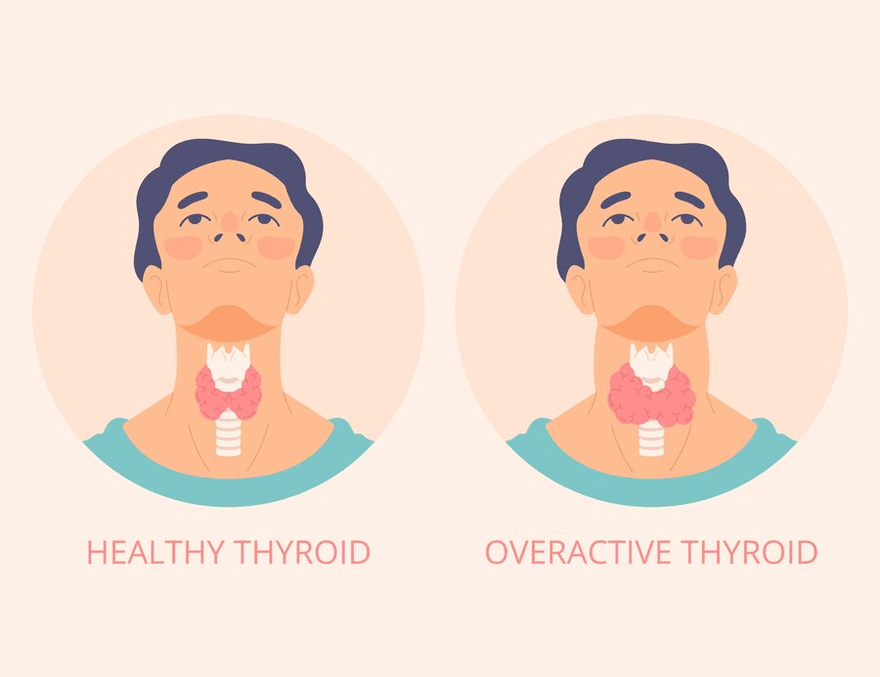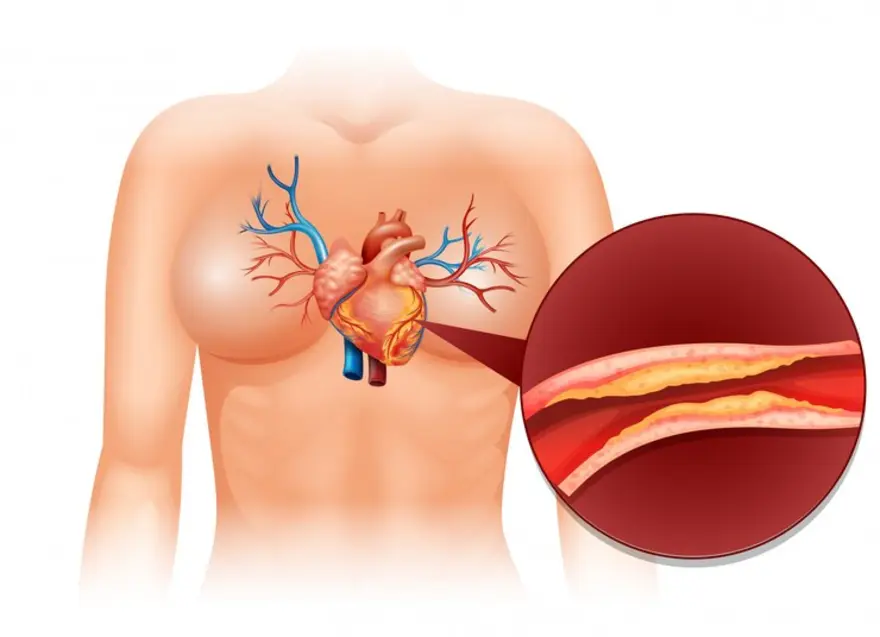Thyroid symptoms
Everything You Need to Know About Thyroid Diseases
What Is the Thyroid? Your thyroid gland is a small organ in the front of your neck, wrapped around your windpipe. The shape of your thyroid looks like a small butterfly in the middle but has two broad wings that span across the sides of your throat. Your thyroid is one gland that helps make the hormones needed to control your body's vital functions, like regulating blood pressure, body temperature and heart rate. A thyroid problem can have an impact on your entire body. If your thyroid gland creates too much of the thyroid hormone, it can develop a condition called hyperthyroidism. On the other hand, if it makes too little thyroid hormone, it can cause hypothyroidism. What Does the Thyroid Do? Two specific thyroid hormones, T4 (thyroxine, which contains four iodine atoms) and T3 (triiodothyronine, which includes three iodide atoms), help control your metabolism. The thyroid creates these hormones, and they are used to tell your body's cells how much energy they can use. In a properly functioning thyroid, your body can maintain the right amount of hormones that keep your metabolism working correctly. As these hormones are used, more are created to replace them. Another gland called the pituitary is responsible for supervising this entire process. This gland is located at the centre of your skull below your brain. When the pituitary gland finds a low amount of T3 and T4 hormones in your system, it will release another hormone known as the thyroid stimulating hormone or TSH that tells your thyroid that your body needs more hormones to get back to normal. On the other hand, if there is an excess of T3 or T4 in your blood, the pituitary gland will adjust the amount of TSH it produces to reduce these hormone levels and avoid thyroid diseases. What Is Thyroid Disease? Thyroid disease is the term used for any medical condition that hampers your thyroid gland from producing the right amounts of hormones. When there is an increased production of T3 and T4 hormones, your body uses its energy too quickly, leading to a condition known as hyperthyroidism. Using power too quickly can cause you to be more tired, make your heart beat faster, lose weight quicker without even trying, and even make you feel more nervous. Conversely, too little production of thyroid hormones can cause a thyroid disease known as hypothyroidism. This means your body will have too little thyroid hormone, making you feel tired faster, gain weight and be unable to tolerate colder temperatures. Hyperthyroidism and hypothyroidism are two of the primary thyroid diseases. Still, different conditions can cause them and can also be inherited from your parents and them from their parents. Who Is Affected by Thyroid Disease? Thyroid diseases can affect anyone; men, women, teenagers, infants and the elderly are all prone to this disease. Hypothyroidism can be present right from birth, or it can develop over time, most often in women who have gone through menopause. Thyroid disease is a common disorder, and it is estimated to affect around 42 million people in India. Women are between five and ten times more likely to develop thyroid diseases than men. Some factors that can put you at higher risk of developing a thyroid problem are If you have a family history of thyroid diseases If you have medical conditions like pernicious anaemia, primary adrenal insufficiency or Type 1 diabetes If you take any medication that is very high in Iodine, like amiodarone If you are older than 60 years of age If you have had treatments like radiation or thyroidectomy for a thyroid condition or cancer What Causes Thyroid Disease? Hypothyroidism and hyperthyroidism are two diseases that other diseases can cause but impact the way your thyroid gland works. Hypothyroidism can be caused by conditions like Thyroiditis: This is a disease in which an inflammation in the thyroid causes the production of lower amounts of thyroid hormones. Hashimoto's thyroiditis: This is a painless disease in which the body's cells attack and damage the thyroid gland. It is an autoimmune condition often passed down from generation to generation. Postpartum thyroiditis: It is a temporary condition that can occur in women who have just given birth. This condition affects 5% to 9% of women after childbirth. Iodine deficiency: The thyroid gland uses Iodine for the body to transduce hormones. An iodine deficiency is one of the leading causes of thyroid disease, affecting several million people globally. Non-functioning thyroid: In rare cases, your thyroid gland may not function correctly right from birth. Recent stats have shown that around 1 in 4000 newborns can have this condition. If this is left untreated, it can cause both physical and mental issues in the child as they grow older. All newborns undergo a thyroid screening test in the hospital to understand their thyroid function. Hyperthyroidism is caused due to Graves disease: A condition in which the thyroid gland may be overactive and produce excessive hormones. This disease is also known as diffuse toxic goitre or enlarged thyroid gland. Nodules: Hyperthyroidism is often also caused by overactive nodules in the thyroid gland. One nodule is called a toxic autonomously functioning thyroid nodule, while a gland with many nodules is called a toxic multinodular goitre. Thyroiditis: This disorder is either very painful or may not be felt. In this condition, the thyroid slowly releases the hormone it stores. This can last anywhere between a few weeks to a few months. Excessive Iodine: High levels of Iodine in your body affect the thyroid, causing an excessive production of thyroid hormones. Is There a Higher Risk of Developing Thyroid Disease If I Have Diabetes? Those with diabetes are at higher risk of developing thyroid disease than those who do not have diabetes. Type 1 diabetes is an autoimmune disorder, and if you already have some form of autoimmune disease, you are more likely to develop another. If you have type two diabetes the risk is slightly lower but still very present. Those with Type 2 diabetes are also likely to develop some form of thyroid disease later in life. Regular testing for different types of thyroid diseases can help catch any thyroid problems well in advance. Although there is no set testing schedule for individuals who have Type 2 diabetes, it is best to talk to your healthcare provider about how often you need a thyroid test. A few simple ways to feel better for those who have diabetes and have tested positive for thyroid disease is Getting enough sleep Keeping track of your diet Regular exercise Taking your medication as directed by your healthcare provider Getting tested as often as your doctor suggests What Common Symptoms Can Happen with Thyroid Disease? There are a variety of thyroid disease symptoms you may experience if you have thyroid disease. However, thyroid disease symptoms are very similar to other medical conditions that may arise in the later stages of your life, so it is a little tricky to differentiate between early warning signs of thyroid problems and what is not. Symptoms of hyperthyroidism (overactive thyroid): Anxiety, nervousness, irritability Trouble sleeping Unexplained loss of weight Enlarged thyroid gland or goitre Muscle weakness and tremors Irregular menstrual periods or a break in your menstrual cycle Heat sensitivity and increased sweating Symptoms of hypothyroidism (underactive thyroid) Feeling tired Weight gain Forgetfulness Regular and heavy menstrual periods Dry and coarse hair Changes in your voice Inability to tolerate cold temperatures Can Thyroid Issues Make Me Lose My Hair? Hair loss is a common thyroid disease symptom, especially for hypothyroidism. If you experience excessive hair loss, that is concerning; you can talk to your doctor about solutions and what can help. Can Thyroid Issues Cause Seizures? In many cases, thyroid diseases will not cause seizures. However, if you are suffering from severe cases of hypothyroidism that have not yet been diagnosed or treated, there are chances that you will develop low serum sodium. This could lead to seizures. How Is Thyroid Disease Diagnosed? The thyroid disease symptoms are very similar to other conditions, so they can be easily confused. Ageing and pregnancy also show similar signs and are two of the leading causes of thyroid in females. Thanks to modern medicine, thyroid tests now help determine if the symptoms you display are related to a thyroid disease. These tests include Blood Tests A blood test is one of the most effective diagnoses of thyroid disease. Thyroid blood tests help understand if your thyroid gland is functioning effectively as they measure the amount of thyroid hormone in the blood. During this test, blood is drawn from a vein in the arm and then sent to the lab for further testing to diagnose hyperthyroidism and hypothyroidism. Disease-specific blood tests for thyroid diseases include Thyroid-stimulating hormone (TSH) test: This is often the first test your doctor may ask you to do, as this hormone secreted by the pituitary gland helps balance the levels of thyroid hormones, including T3 and T4, in your body. Most often, a deficiency in thyroid hormones or hypothyroidism is caused by elevated levels of TSH, while hyperthyroidism/high levels of thyroid hormones are a result of low TSH levels. Any abnormality found in the measurement of TSH may result in the need to measure the levels of your thyroid hormones, including T3 and T4. The usual range of TSH in adults is between 0.40 and 4.50 mlU/mL. T4: In the case of both hyperthyroidism and hypothyroidism, a T4/thyroxine test is used to monitor how well the treatment works for your thyroid disease. Low levels of T4 hormone are an indication of hypothyroidism, while higher levels of this hormone are seen in cases of hyperthyroidism. The normal range for T4 hormones in adults ranges from 5.0 to 11.0ug/dL. T3: A triiodothyronine test helps in the diagnosis of hyperthyroidism. It also measures the severity of the disorder so you can get the proper treatment on time. While low levels of T3 hormone are observed in hypothyroidism, this test is more commonly used for the diagnosis and monitoring of hyperthyroidism where your T3 levels are elevated. The normal range for T3 in humans is between 100-200 ng/dL. FT4: A free thyroxine or T4 test measures T4 hormones present in the blood, eliminates the effects of proteins that naturally bind to T4, and can prevent any accurate measurement during the T4 test. The normal range for FT4 in adults is between 0.9 and 1.7 ng/dL. FT3: In the same way, the free triiodothyronine or free T3 test measures the amount of T3 hormone present in the blood that eliminates the effects of proteins that naturally bind to T3, which can cause a discrepancy in the measurement of this hormone in your blood. The normal range for FT3 in adults is between 2.3 and 4.1 pg/mL. While these tests cannot help diagnose thyroid disease, they can help guide your healthcare provider towards the proper diagnostic test to evaluate the possible thyroid disorder. Additional tests can include Thyroid antibodies: This test aids in identifying the different types of autoimmune thyroid diseases. The most frequently used thyroid antibody tests include microsomal antibodies, also known as thyroid peroxidase antibodies or TPO antibodies, and thyroid receptor antibodies, which contain tests for thyroid-stimulating immunoglobulins (TSI) and thyroid-blocking immunoglobulins (TBI). Calcitonin: This test is often used to diagnose rare thyroid diseases such as C-cell hyperplasia and medullary thyroid cancer. Thyroglobulin: This test is used in the diagnosis of thyroiditis or thyroid inflammation and to monitor the treatment of your thyroid cancer. You must speak to your healthcare provider about all the tests available and which one is most suitable for your needs. In some cases, the ranges for these tests also differ from person to person, so consult your healthcare provider if you have any concerns or worries about your test results. Imaging Tests Some thyroid diseases can be diagnosed by just looking at your thyroid gland. Your healthcare provider may carry out an imaging test known as a thyroid scan, which allows them to look at your thyroid and understand if there are any changes in its size or shape. It also helps look for thyroid nodules, one of the most common thyroid causes. An ultrasound imaging test can be used to test your thyroid gland. This test uses high-frequency sound waves inaudible to the human ear through your body tissue. The waves that echo back are then recorded and transformed into photographic images or videos that can be further used to diagnose different thyroid diseases. Unlike X-rays, ultrasound waves do not use radiation. Little or no preparation is needed for this test; all you have to do is lie flat on a padded examination table with your head on a pillow so it is a little tilted back. A water-soluble gel is then applied to your skin, where you must be examined. Your healthcare provider will then apply a probe on your neck and move it around to check your thyroid. This test can take about 20-30 minutes. Physical Exam This is a quick and easy way for your healthcare provider to check for any extra growths or enlargements in your thyroid. How Is Thyroid Disease Treated? The main goal of your thyroid treatment is to get your thyroid levels back to normal. This can be done in multiple ways, and the specific treatment you need will depend on the thyroid causes. Thyroid treatment for high levels of thyroid hyperthyroidism includes Antithyroid drugs (propylthiouracil and methimazole): These medications help stop the gland's production of thyroid hormones. Beta-Blockers: These medicines do not alter the amounts of hormones in the body but aid in managing the symptoms of your thyroid disease. Radioactive Iodine: This type of treatment causes damage to the cells of your thyroid gland, leading to a lower production of thyroid hormones. However, this is not how to control the thyroid in pregnant females, as it can affect the foetus. Surgery: This is a more permanent type of thyroid treatment and is often done in severe cases. In this form of therapy, your healthcare provider will surgically remove your thyroid gland, thus stopping it from creating more hormones. However, in this case, you will have to take thyroid replacement hormones for the rest of your life. Thyroid treatment options for hypothyroidism or low levels of thyroid hormone include Thyroid replacement medication: This is one of the most commonly used thyroid treatment options, in which a synthetic drug is used to add thyroid hormones to your body. The primary drug used in this case is known as levothyroxine. With the help of this medication, you will be able to manage your thyroid disease and live a relatively everyday life. Are There Different Types of Thyroid Removal Surgery? If your healthcare provider determines that your thyroid needs to be removed, he may do several surgeries. The first choice is between partially and completely removing your thyroid. This usually depends on how severe your condition is. If your thyroid is enlarged or has several growths, this can prevent you from being eligible for some types of surgery. A surgery that removes your thyroid is called a thyroidectomy. There are two main ways this surgery can be done. Through an incision in the front of your neck Through an incision in your armpit An incision in the front of your neck is a traditional method used to carry out thyroidectomy. This helps the surgeon to go straight into your throat and remove your thyroid gland. This is still the best option for most cases and is used in cases where your thyroid is particularly big or contains several large nodules. When used through an incision in your armpit, the other method creates a tunnel to your thyroid. This is made with a unique tool called an elevated retractor. It creates an opening that can connect the incision from your armpit to your thyroid. The surgeon then uses a robotic arm that moves through the tunnel and gets to the thyroid. It then removes the thyroid and returns through the tunnel, bringing it with it. This is a scarless surgery as the incision under your arm is often out of sight. However, it is a more invasive form of surgery and more complicated as compared to the incision in the throat. You may not even be a candidate for this form of surgery if you are Not at your healthy body weight Have huge thyroid nodules Have any conditions like Graves's disease or thyroiditis Talk to your doctor about all the available treatment options and which kind of surgery would be best for you. How Long Does It Take to Recover from Thyroid Surgery (Thyroidectomy)? It usually takes your body up to a few weeks to recover from a thyroidectomy or surgical removal of your thyroid. However, there are a few precautions you have to take during this recovery period. Avoid submerging the incision underwater. Do not lift any object that is heavier than 15 pounds. Avoid anything more than light exercise. These precautions are to be taken for about 2 weeks, after which you can return to normal activities. How Long After My Thyroid Is Removed Will My Tiredness Go Away? Immediately after your surgery, you will be given medications that will help with your symptoms of fatigue. Even after removing your thyroid, your body will still have the thyroid hormones circulating. These hormones typically stay within your body for 2 to 3 weeks before being naturally drawn. You will then need to take medication to reintroduce new hormones into your body after your thyroid has been removed. A little tiredness is a normal part of your recovery after any surgery, as it takes your body time to heal. If you are still experiencing fatigue and other symptoms of thyroid disease even after the surgery, it is essential to talk to your healthcare provider about what needs to be done. Can I Check My Thyroid at Home? There is a quick and easy home thyroid test that you can do to check for any thyroid diseases. The only tools you will need are a glass of water and a mirror. The steps for this thyroid self-exam are Identify where your thyroid is located. You should find it on the front of your neck, between your collarbone and Adam's apple. The Adam's apple is more prominent and easy to locate in men; it is best to look at the region above the collarbone for women. Tip your head back when looking in the mirror and find a spot on your neck that you will pay attention to when you start the examination. Once you are in position and ready to start, drink water with your head tilted back. Watch your thyroid as you swallow the water. During this test, You must look for lumps or bumps in the thyroid area. Swallowing water helps make these changes in your thyroid more prominently visible. Repeat this test several times to ensure you have had a good look at your thyroid. If you find any lumps or bumps, you must visit your healthcare provider to determine the next steps. Should I Exercise If I Have a Thyroid Disease? Regular exercise is a crucial part of living a healthy lifestyle. You do not need to change your workout routine if you have thyroid disease, as exercise does not drain your body's thyroid levels. However, talking to your healthcare provider and getting a general health checkup before starting any new exercise routine is essential. Can I Live an Everyday Life with a Thyroid Disease? Although thyroid disease is a medical condition that lasts throughout your life, there are ways to manage the symptoms and live a healthy life. This will involve you taking medication to control your thyroid hormone levels daily. Your doctor will also closely check your thyroid levels to check how well your treatment is working and make any adjustments it may need over time. Finding your proper thyroid treatment and food plan can take a little time. But once found, you will not have to live with many restrictions. Metropolis diagnostic labs across India provide accurate blood testing and health check-up services. A team of qualified technicians make at-home visits to collect samples, which are processed at advanced diagnostic labs. The reports are shared online via email and the Metropolis TruHealth app.
Thyroid Antibodies Test: When Do you Need It?
The thyroid gland is a vital organ that controls the metabolism, growth, and development of your body. This butterfly-shaped gland is located on the front of your neck, at the base just below Adam’s apple. This gland produces two hormones, triiodothyronine (T3) and thyroxine (T4), through which it regulates various body functions.A matter of grave concern is that the statistics are showing a steady rise in thyroid diseases in the Indian population. At large, thyroid diseases include hypothyroidism (underactive thyroid), hyperthyroidism (overactive thyroid), goiter, thyroid cancer, and thyroid nodules. According to an epidemiological study on thyroid disease*, it is estimated that about 42 million people in India suffer from thyroid diseases, and hypothyroidism happens to be the most common thyroid disease.Your doctor may use various thyroid tests to check thyroid function that include TSH test, T4 test, T3 test, and thyroid antibody test. Usually, a thyroid panel suffices to check the functioning of your thyroid as it covers the TSH, T3 and T4 that collectively give insight into thyroid health. What are Thyroid Antibodies? Thyroid antibodies are proteins made by the lymphocytes in your thyroid gland. Lymphocytes are a type of immune cells that are part of the immune system and present in the lymphoid organs. Antibodies help your body fight germs like viruses and bacteria. However, sometimes antibodies may start to attack the body's own cells, tissues, and organs mistakenly. This is called an autoimmune response.When thyroid antibodies target and attack healthy thyroid cells, this leads to an autoimmune disorder of the thyroid. While some antibodies may destroy thyroid tissue and lead to low levels of thyroid hormones, others may cause the thyroid to make too much of them. A thyroid antibodies test helps detect thyroid antibodies: What Does it Mean When You Test Positive for Thyroid Antibodies? Thyroid antibodies in your blood suggest that your thyroid related symptoms are occuring due to an autoimmune disorder, such as Hashimoto's disease or Graves' disease. Different types of thyroid antibodies and the autoimmune diseases caused by them are listed here: Thyroid peroxidase antibodies (TPO): These antibodies can indicate: Hashimoto’s disease, also called Hashimoto thyroiditis: It results in lack of thyroid hormones and is the most common cause of hypothyroidism. When your thyroid doesn't make enough thyroid hormones, it is known as hypothyroidism.. Graves' disease: This is the most common cause of hyperthyroidism. When the thyroid makes too much of certain thyroid hormones, it is known as hyperthyroidism. Thyroglobulin antibodies (Tg): These antibodies can also be an indicator of Hashimoto disease. Thyroid-stimulating hormone (TSH) receptor: These antibodies can indicate Grave's disease. Most people with Hashimoto disease have high levels of both Tg and TPO antibodies. Need to book a thyroid antibody test? Explore Metropolis.thyroid test at home When Should You Get Tested for Thyroid Antibodies? Testing may be ordered if you have symptoms of a thyroid problem and your doctor doubts they may be caused by an autoimmune condition of thyroid (Hashimoto disease or Grave's disease). Symptoms of Hashimoto’s disease are: Weight gain Tiredness Hair loss Irregularity of periods Constipation Pain in the joints Low tolerance for cold temperatures Symptoms of Grave's disease include: Weight loss Bulging of the eyes Tremors in the hand Difficulty in sleeping Increased heart rate Swollen thyroid Low tolerance for heat Have these symptoms and are still awaiting a correct diagnosis? Book your thyroid antibodies test with Metropolis and get accurate, timely, trustworthy testing, within the comfort of your home. Book thyroid antibodies test here. What is The Difference Between Hypothyroidism and Hashimoto's Disease? Hypothyroidism means there is some problem with your thyroid gland while Hashimoto's disease is a problem with your immune system. No Test Preparation is Needed.A thyroid antibody test needs a simple blood sample. No special test preparation is required to insure the quality of the testing. Do you Need to Repeat Testing for Thyroid Antibodies? Usually, repeat measurements of TPOAb and TgAb in adults is rarely required. Also, it may not usually influence the ongoing treatment. However, in children, repeat antibodies testing may be asked for when they move from child to adult care. Can You Prevent Getting Thyroid Antibodies? There are no lifestyle changes that can prevent or eliminate thyroid antibodies. Hence, make sure to discuss your symptoms with a doctor to be aware of the autoimmune condition to get started on their management side as soon as possible. Because thyroid health is crucial! Your symptoms are an important part of the diagnosis. Do not ignore testing since blood tests are currently the most accurate way to diagnose and manage thyroid disorders. If you have questions about your thyroid disorder, speak to your doctor. As advised, ensure to get your hormone levels checked on a regular basis and keep a check on your thyroid health.
Thyroid Blood Tests: Types, Symptoms and Interpreting Test Results
Your body has several glands to perform various body functions. The thyroid is a small gland located at the front of the neck, right at the spot where a bow tie would rest. It makes two types of thyroid hormones: triiodothyronine (T3) and thyroxine (T4). It helps your body maintain its metabolic rate, and do numerous other things, including getting energy from food, growing, and going through sexual development. Thyroid Tests The thyroid blood tests (also called thyroid panel) are simple lab tests that check if your thyroid is functioning right or not. In people who have already been diagnosed with thyroid problems, the tests are used to monitor and guide treatment. Types of Thyroid Blood Tests T4 Test: This test measures the levels of the hormone T4 (thyroxine) in your blood. It might be done in one or both of the following ways: Total T4, which measures the total amount of thyroxine in the blood. This includes the amount of T4 attached to blood proteins, which help the hormone move through the bloodstream; and free T4, which measures only the amount of free thyroxine that is not attached to blood proteins. T3 test: This test measures the level of another major thyroid hormone. It again can be of two types: T3 totaI and free T3. TSH Test: A thyroid-stimulating hormone (TSH) test is the most significant tool, in a way, to tell how well the thyroid is working. If you have any problem related to the thyroid gland and it prevents the gland from making enough thyroid hormone, another gland, called the pituitary gland, releases more TSH into the blood. If the thyroid is making too much thyroid hormone, the pituitary releases less TSH, which means less TSH levels in the blood. Thyroid antibodies test: There is one thyroid condition, called Hashimoto's thyroiditis, which is an autoimmune condition. This means the body’s own immune system attacks the thyroid gland. A test that checks for high levels of antibodies helps detect this condition. Antibodies are a sign of the immune system going awry and attacking the thyroid gland. Generally, two types of thyroid antibodies are measured: thyroglobulin antibodies (TgAb) and thyroid peroxidase antibodies (TPO). Symptoms and Diagnosis A high TSH level most often means you have low thyroid hormone levels in the blood (condition is called hypothyroidism), or an underactive thyroid. This implies that your thyroid isn’t making enough hormones. As a result of which the pituitary gland has to make and release extra TSH into your blood to stimulate the thyroid gland. A low TSH level usually means you have high thyroid hormone levels in the blood (condition is called hyperthyroidism), or an overactive thyroid. This implies that your thyroid gland is making excess hormones, and that is why the pituitary gland has reduced or stopped making and releasing TSH into your blood. A high T4 level may mean you have hyperthyroidism. A low level of T4 may mean you have hypothyroidism. If the TSH levels are elevated, T4 levels are normal to low, and T3 levels are normal, it might indicate early hypothyroidism. In some cases, high or low T4 levels may not mean you have thyroid problems since the levels might be affected due to factors such as pregnancy, certain medicines (oral contraceptives, corticosteroids, etc), severe illness, and other health problems. Basically, these conditions and medicines alter the number of proteins in your blood that “bind,” or attach, to T4.Please note that your doctor is the best guide to interpret your thyroid test results and suggest the diagnosis. HypothyroidismIf your thyroid is underactive, it makes too little thyroid hormone, which leads to hypothyroidism. Your body’s metabolic rate goes down and it uses up energy more slowly. Symptoms include tiredness, feeling cold, constipation, dry skin, infrequent menses or absent periods in women, and slow height growth in children. HyperthyroidismIf your thyroid is overactive, it releases too much thyroid hormone, which leads to hyperthyroidism. Your body’s basal metabolic rate goes up and it uses up energy more quickly than it should. Symptoms include sweating, trembling, weight loss, diarrhea, irregular menses or (increased bleeding which might also occur) in women, and fast heartbeat. Why You May Need a Thyroid Test? It is not uncommon to have hypothyroidism and still being unaware of the condition. It might take some time for symptoms to be noticeable. Regular thyroid screening helps get diagnosed on time and seek early treatment. It is more important to get tested if thyroid conditions run in your family. The more family members that have thyroid disease, the higher the chances the person will experience a thyroid disease.Moreover, women of all ages are more likely than men to have low thyroid hormone levels. If you're 60 or older, it's a good idea to check with your doctor to see whether your medical history suggests you might benefit from getting testing for thyroid levels. What You Can Do If you seem to have any of the symptoms of low or high thyroid levels, talk to your doctor and get tested as advised. Do not ignore any health symptoms. Getting the right treatment can help you get complete control of your thyroid-related symptoms.
 Home Visit
Home Visit Upload
Upload

















 WhatsApp
WhatsApp